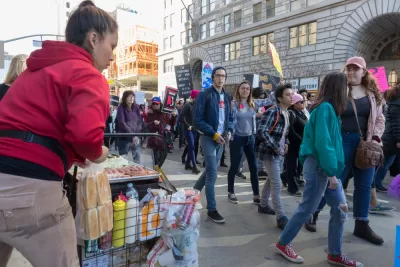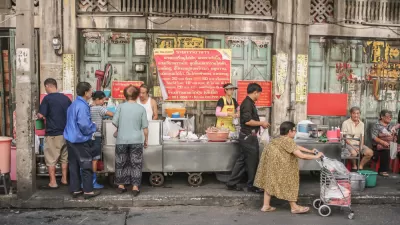The new ordinance brings long-awaited legal legitimacy to sidewalk vending in Los Angeles.

Sahra Sulaiman writes of the details of a Los Angeles City Council committee hearing this week that preceded the approval by the full council of a new ordinance that brings the city into conformity with state law and begins the process for the city to create a permitting process for sidewalk vendors.
State law SB 946, signed by Governor Jerry Brown earlier this year, decriminalized sidewalk vending, and was touted as a victory social justice, but a defeat for local control. Sulaiman explains that the law hadn't done much to improve the situation for sidewalk vendors in Los Angeles, yet:
Even with the decriminalization of sidewalk vending last year, the lack of a formal ordinance meant street vendors were still experiencing harassment from law enforcement, racking up hefty fines they struggled to pay off, and worrying about deportation. It was eating into their livelihoods and making them afraid of losing everything every time they set up their goods.
To address the state law, the city proposed two alternatives for its sidewalk vending ordinance. One would have set up a regulatory model that "would have only required compliance with regulations," but also "it would not have generated funding for a monitoring and compliance program, making it much less attractive to the city."
Instead the city chose a permitting model, and final controversies over the ordinance centered around revisions to the draft ordinance and questions about vending in parks.
Sulaiman wrote the article after a joint meeting of the Public Works and Gang Reduction, Economic Development, and Arts, Entertainment, Parks, and River Committees on Tuesday, November 28, but also confirmed via Twitter that the ordinance had passed the full council on Wednesday, November 28.
Additional, up-to-date coverage by Emily Alpert Reyes has also been published by the Los Angeles Times.
FULL STORY: City Council Set to Approve Historic Sidewalk Vending Ordinance

Trump Administration Could Effectively End Housing Voucher Program
Federal officials are eyeing major cuts to the Section 8 program that helps millions of low-income households pay rent.

Planetizen Federal Action Tracker
A weekly monitor of how Trump’s orders and actions are impacting planners and planning in America.

Ken Jennings Launches Transit Web Series
The Jeopardy champ wants you to ride public transit.

Crime Continues to Drop on Philly, San Francisco Transit Systems
SEPTA and BART both saw significant declines in violent crime in the first quarter of 2025.

How South LA Green Spaces Power Community Health and Hope
Green spaces like South L.A. Wetlands Park are helping South Los Angeles residents promote healthy lifestyles, build community, and advocate for improvements that reflect local needs in historically underserved neighborhoods.

Sacramento Plans ‘Quick-Build’ Road Safety Projects
The city wants to accelerate small-scale safety improvements that use low-cost equipment to make an impact at dangerous intersections.
Urban Design for Planners 1: Software Tools
This six-course series explores essential urban design concepts using open source software and equips planners with the tools they need to participate fully in the urban design process.
Planning for Universal Design
Learn the tools for implementing Universal Design in planning regulations.
Heyer Gruel & Associates PA
Ada County Highway District
Institute for Housing and Urban Development Studies (IHS)
City of Grandview
Harvard GSD Executive Education
Toledo-Lucas County Plan Commissions
Salt Lake City
NYU Wagner Graduate School of Public Service





























